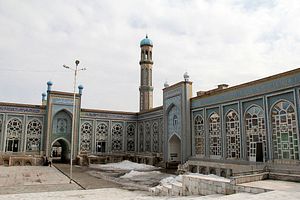Technically, freedom of religion is enshrined in the constitution of Tajikistan. But in reality, religious practice–at least for members of the country’s Muslim majority–is tightly controlled by the state. In recent months, Tajikistan has further steadied its grip on the practice of Islam with the president commenting on proper attire, reports of forced beard-shavings, and new regulations on who can travel to Mecca on hajj.
Until last month’s parliamentary elections, Tajikistan was the only Central Asian state in which political Islam had representation. The Islamic Renaissance Party of Tajikistan (IRPT) is widely touted as the only legally registered religious party in the region. While true, in the March election (unsurprisingly flawed) the IRPT lost, and for the first time since its legalization following the civil war will be out of government entirely. To add insult to injury the country’s official religious bodies have called for the IRPT to be banned, and some have suggested it should be labeled a terrorist organization.
The tightening grip of the state on Islam extends beyond politics. The State Committee on Religious Affairs (CRA) is responsible for overseeing and implementing laws relating to religion–including registration of religious groups, regulation of imports of religious materials, and oversight of mosques and churches. The Council of Ulema guides the Tajik Muslim community and while nominally independent, presents a state-approved version of Islam.
There are laws on the books banning female students from wearing hijabs, prohibiting those under the age of 18 from from participating in public religious activities, except funerals, which are regulated anyway. According to the U.S. Department of State’s 2013 International Religious Freedom Report:
The law regulates private celebrations and funeral services, including weddings and Mavludi Payghambar (the Prophet Muhammad’s birthday). The law limits the number of guests, eliminates engagement parties, and controls ceremonial gift presentations and other rituals. The religion law reiterates these principles, mandating that “mass worship, religious traditions, and ceremonies should be carried out according to the procedure of holding meetings, rallies, demonstrations, and peaceful processions prescribed by law.”
State control of religious expression extends to personal dress and grooming. In January 2014, Tajik Imams were issued new uniforms, and Abdulfattoh Shafiev wrote recently for Global Voices about several incidents of forced beard-shaving.
On March 31 a visitor to Khujand lost his way, and asked a local policeman how to find it again. The 38-year-old man, who grew a beard after a pilgrimage to the Kaaba five years ago, soon regretted his question.
He claims he was taken to a police station, beaten, and forcefully shaved.
As in the other former Soviet republics of Central Asia, the government of Tajikistan is fiercely secular while the people are mostly Muslim. The influence of Soviet communism on religion in the region should not be discounted, and fundamentally influences the relationship between people, their religion, and politics. In a paper published by Chatham House last November, John Heathershaw, and David W. Montgomery identify the claim that political Islam opposes the secular state as one of the six myths of post-Soviet Muslim radicalization in Central Asia. Myth or not, the worry that political Islam could challenge the establishment, persists.
This week, Interfax reported that the CRA said in a press conference that only people over the age of 35 would be among those permitted to perform the annual pilgrimage (hajj) to the Islamic holy sites at Medina and Mecca this year. CRA is responsible for registering those who wish to travel for hajj. Saudi Arabia, which establishes national quotas in order to regulate the overwhelming flood of faithful each year, has reportedly lowered Tajikistan’s quota from 8,000 to 6,300 people.
One way to view the Tajik government’s age restriction is practicality–this is an easy way to trim the applicant pool. But in light of other trends, and the government’s overwhelming fear of youth radicalization, the dictum feeds into a larger narrative chronicling Tajikistan’s crackdown on Islam.
































